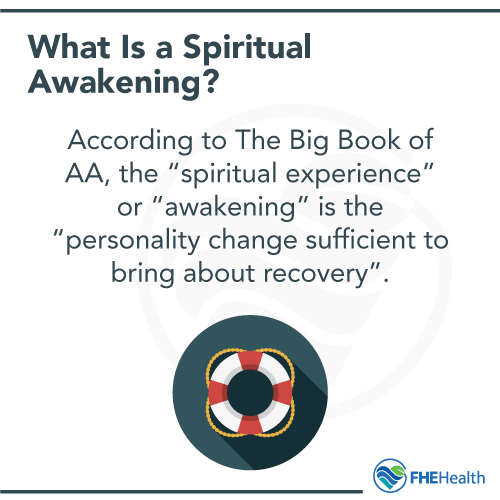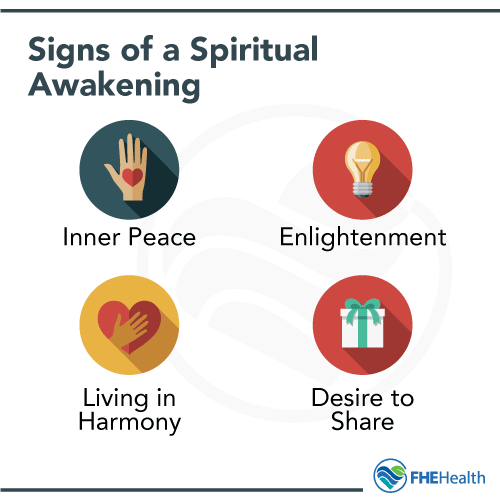
Twelve-step programs are an important part of many people’s journey to sobriety, with estimated AA member counts reaching the millions worldwide, and it’s the last step that talks about the idea of a spiritual awakening. This may sound a little vague, and it is, because what spiritual awakening is and how it manifests in a person’s life is highly individual. Below we attempt to define spiritual awakening, discuss how it can help your recovery and explain some signs that may help you recognize when you’ve gone through it.
What Is a Spiritual Awakening and What Does It Mean?
 For addicts who have struggled with getting sober and are finally on the road to recovery, the idea of a spiritual awakening sounds great. Who wouldn’t want to be more enlightened or in touch with a higher power — addiction or not? But what does spiritual awakening mean? The answer is, it depends.
For addicts who have struggled with getting sober and are finally on the road to recovery, the idea of a spiritual awakening sounds great. Who wouldn’t want to be more enlightened or in touch with a higher power — addiction or not? But what does spiritual awakening mean? The answer is, it depends.
While many people who go through a 12-step program focus on the Christian idea of God and Jesus, this idea of a spiritual awakening is very individual and not tied to any one religion. It’s the idea of recognizing that a higher power is in control and then trying to “carry this message to alcoholics, and to practice these principles in all our affairs.”
For many people, a spiritual awakening comes with a feeling of inner peace and stability. It also is often accompanied with a new or renewed interest in spiritual life and practices, including but not limited to prayer, yoga, meditation and attending religious services.
How Does Having a Spiritual Awakening Help Your Recovery?
Just about anyone can benefit from more peace and a feeling of being grounded, but for addicts, a spiritual awakening can be a huge step forward into sober life. A spiritual awakening is an important step in recovery because it takes the focus off the addict and starts to bring them more in tune with how they fit into the larger scope of humanity and the world. It’s also usually when they start to focus more on others instead of themselves.
Step 12 is based around how you can help other people and be a force for good in the world after you’ve had a spiritual awakening. This could encompass everything from being a sponsor or volunteering your time at a charity to simply trying to be as kind and nonjudgmental as possible when interacting with others.
It’s important to note here that a spiritual awakening isn’t something you can achieve by doing certain things or trying hard enough. It’s a personal event that may come on slowly until you look back and realize that you’re already on the other side, or it may happen all at once as a moment of sudden enlightenment.
You must truly desire to have a spiritual awakening and be open to the idea. For those who have had bad experiences with religion or who just have no experience or background with spiritual things, it can be difficult to wrap your head around. It’s something that can take quite a bit of time and shouldn’t be rushed. Remember that a spiritual awakening is the beginning of a new life, not an end goal.
What Are the Signs of a Spiritual Awakening?
 If you’re not sure you’ve had a spiritual awakening or want to know what to expect, some of the common things addicts experience are:
If you’re not sure you’ve had a spiritual awakening or want to know what to expect, some of the common things addicts experience are:
- A sense of inner peace
- A feeling of enlightenment
- A desire to live in harmony with others and the world as a whole
- A desire to bring your message to others
While you will likely feel something is “different” as you go through a spiritual awakening, for most people, it’s easier to recognize this turning point in retrospect. This is because it’s often not so much an “ah-hah” moment as it is a “there has to be a better way” moment, but this doesn’t mean that everything changes right then forever.
Even with a spiritual awakening, you’re still human, and there will be days of struggle and times when you aren’t sure anyone is really listening to those prayers. That doesn’t mean you didn’t have a spiritual awakening or you’re doing anything wrong. Doubts and struggles are part of the human experience, which is exactly why we need that recognition and relationship with a higher power.
What Do You Do With Your Awakening?
You’ve had a spiritual awakening, and you’re excited for this next step in your life. But what do you actually do with your spiritual awakening in real-life practice? According to Step 12, the main idea is to then “carry the message” to others. What this looks like will depend on your individual journey, but some common ideas are:
- Giving selflessly. This means giving of your time, knowledge and/or resources without expecting anything back. As an addict, you are uniquely positioned to understand the struggles of other addicts, which is why many start to reach out to other addicts in this step. Facilitating a 12-step group yourself or acting as a sponsor are both examples. However, this could also involve things not related to addiction, such as volunteering at a charity or being a force for good in your neighborhood.
- Practicing all of the principles of the 12 steps. A common misconception is that the 12 steps are a linear process and once you get through them, you’re done. In reality, the 12 steps are things you continue to practice for the rest of your life as best you can.
If you or a loved one is currently struggling with a substance abuse problem or another type of addiction, it’s easy to get lost in the daily life of an addict and feel there’s no way out. But there is hope. At FHE Health, we understand addiction and the toll it can take, and we have the tools and resources to help you get out from under the shadow of addiction and into the light of a healthy, sober life. Contact us today to take that first step.






